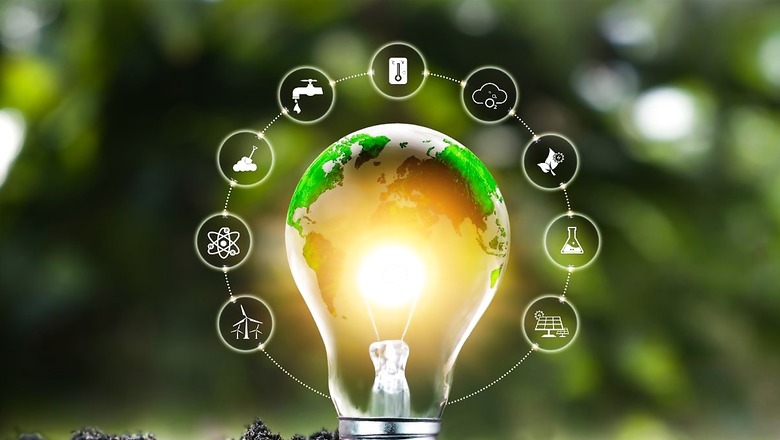
views
As the urgency of addressing climate change grows, it is increasingly apparent that we are not headed in the right direction. Despite our heightened consciousness and efforts, the stark reality is that global temperatures continue to rise. Worsening climate-related disasters and escalating greenhouse gas emissions all underscore the inadequacy of our current approaches.
Rather than quick fixes or temporary solutions, there is a need to fundamentally re-evaluate our approach. This is particularly important considering technological advancements that are providing new opportunities to transcend the limitations imposed by traditional models.
Rise of Decentralised Energy Systems
Centralised energy production and distribution systems have remained inefficient and insufficient in ensuring access to energy for all. According to the World Energy Outlook report by the International Energy Agency, 745 million people globally still lack access to energy.
As renewable technologies such as solar and wind power mature, they are paving ways for decentralised energy systems that can deliver greater accessibility, reliability, and sustainability in energy provision, particularly in underserved regions.
From rooftop solar installations and community solar projects to microgrids and virtual power plants, they are empowering individuals and communities globally to actively generate and consume energy locally. This distributed energy landscape is not only democratising clean energy access, but it is also empowering communities to take control of their energy future. Enhancing energy resilience and fostering local economic development remain additional yields.
By embracing this transformative shift more openly, we stand to construct a more equitable and sustainable energy system that serves the interests of both humanity and the planet.
Need to Empower Grassroots and Women
If 47% of the global population live below the poverty line of $6.85 per day, and nearly half of this demographic being females, it is clear that achieving Net Zero without an inclusive clean energy transition framework is not attainable.
Grassroots communities and women have an important role to play in the global clean energy transition, not only because they represent a significant proportion of the global population, but also because they possess invaluable local knowledge and perspectives that are essential for implementing effective and sustainable clean energy solutions at the grassroots level.
It is true that achieving this widespread inclusion has been a big challenge in the past, the emergence of low-value clean energy assets such as solar cooking stoves, solar carts for vending, and e-rickshaws for transportation is changing that.
The key to clean energy transition at the grassroots level lies in empowering women. Supporting women entrepreneurs can yield significant dividends in establishing grassroots economies centred on clean energy.
Despite the substantial evidence indicating their success, timely loan repayment, and sustainable growth once empowered, access to finance remains a major challenge. Therefore, there is a critical need to address this barrier in order to fully empower women in the clean energy sector.
Imperative to Reimagine Finance
The imperative to reimagine finance cannot be overstated. One cannot catalyse this transition without reimagining energy finance. The existing global energy finance system, dominated by institutionalised lending and major energy players, is not designed to serve the funding needs of decentralised systems, grassroots initiatives, and small-scale projects efficiently and effectively.
As a result, most financial institutions either shy away or struggle to fund low-value clean energy transactions, highlighting the pressing need for diversified finance mechanisms tailored to smaller players and community-led initiatives.
This paradigm shift requires innovative approaches that empower local stakeholders, facilitate access to capital, and foster sustainable development at the grassroots level. Only by embracing such reforms can we unlock the full potential of clean energy and create a more inclusive, resilient financial ecosystem for the future.
Clean Energy Transition for India and Nepal
In the context of India and Nepal, analysing intersections of a participatory ecosystem and clean energy transition wave is of utmost importance considering how both the countries are cooperating for hydroelectricity. Considered less polluting than the other available sources (thermal power etc), and added with the agreement between two countries that is now allowing Nepal to export 10,000 MW of hydroelectricity to India over the next ten years, the capacity-building exercises have started in Nepal for making this transformational deal a reality. Nevertheless, the whole process needs to be given humane consideration on the wisdom of empowering the end users with use of efficient appliances and also making mobility heavily reliant on electric vehicles. In particular, this holds high importance for a country like Nepal, which often faces cyclical fluctuations where it needs to import thermal power from Bihar grids despite having enormous potential with hydroelectricity.
Besides having a positive impact on its bilateral economic relations with Nepal, India’s move to import 10,000 MW hydroelectricity shall help its clean energy transition where the seasonal peaks in the bordering populous states like Bihar, Uttar Pradesh, and West Bengal pose challenges of supply. India’s gain is getting relatively clean energy while Nepal will be the beneficiary of its increased recognition as the emerging international hub of hydroelectricity.
Added to this, assured by India, a passage of power transmission to Bangladesh opens up another market—and thus a glimmer of hope for Nepal.
By keeping policies and action in tandem, the cooperation of India and Nepal in the power sector will have far-reaching effects on the people on both sides. New ways of livelihood options will be created as the local entrepreneurial system gets even closer interface of technology and innovation. On the climate front too, an increased thrust on clean energy transition will be immensely helpful for India and Nepal. As the third edition of the Nepal Investment Summit is scheduled in April 2024, there is a need for extra attention on the clean energy front where India and Nepal can create history by working closely and with understanding.
Conclusion
In conclusion, it is abundantly clear that reimagining the global clean energy transition is not just desirable but imperative in confronting the urgent challenge of climate change. Embracing decentralised systems, empowering grassroots communities and women, and reimagining finance are pivotal steps toward charting a path to a more sustainable and equitable energy future for all. It is through our combined efforts and innovation that we can overcome the challenges ahead and build a world powered by clean and renewable energy.
Atul K Thakur is policy professional, columnist and writer with a special focus on South Asia. Deepak Rauniar is an energy expert from Nepal. Views expressed in the above piece are personal and solely those of the authors. They do not necessarily reflect News18’s views.
















Comments
0 comment